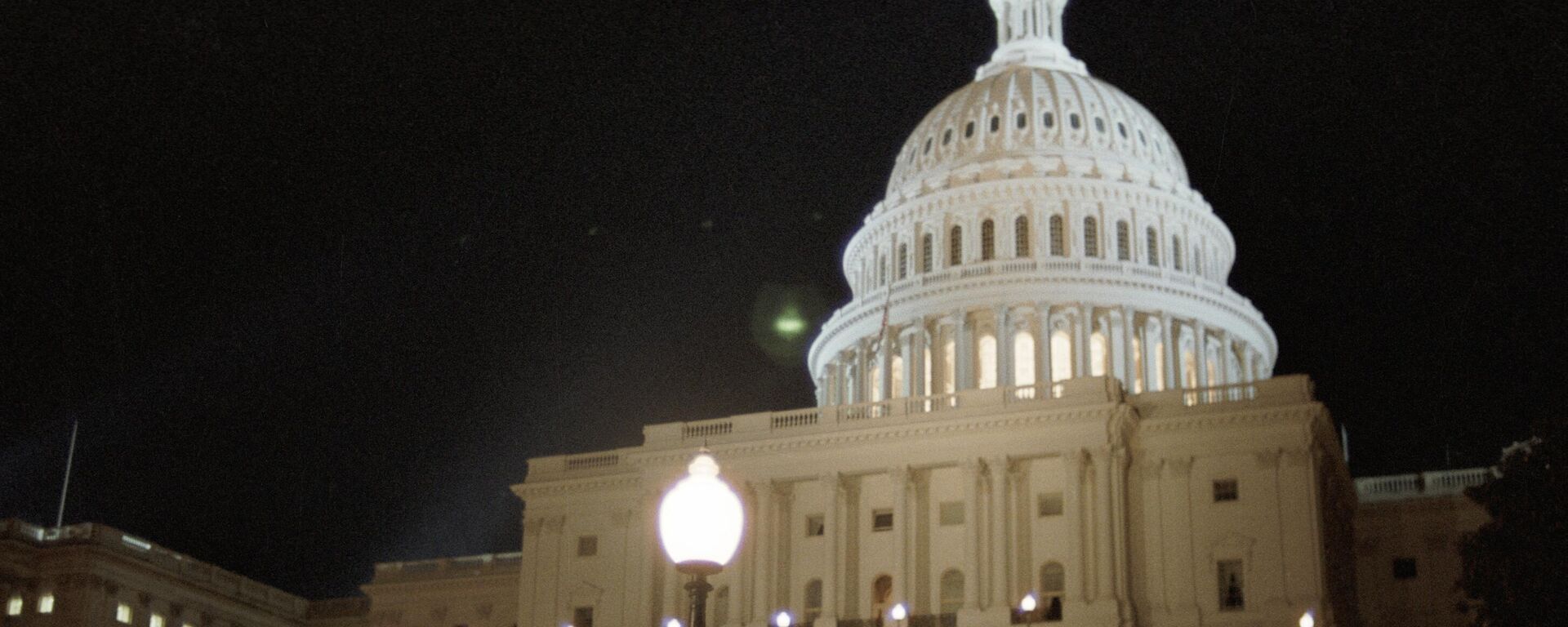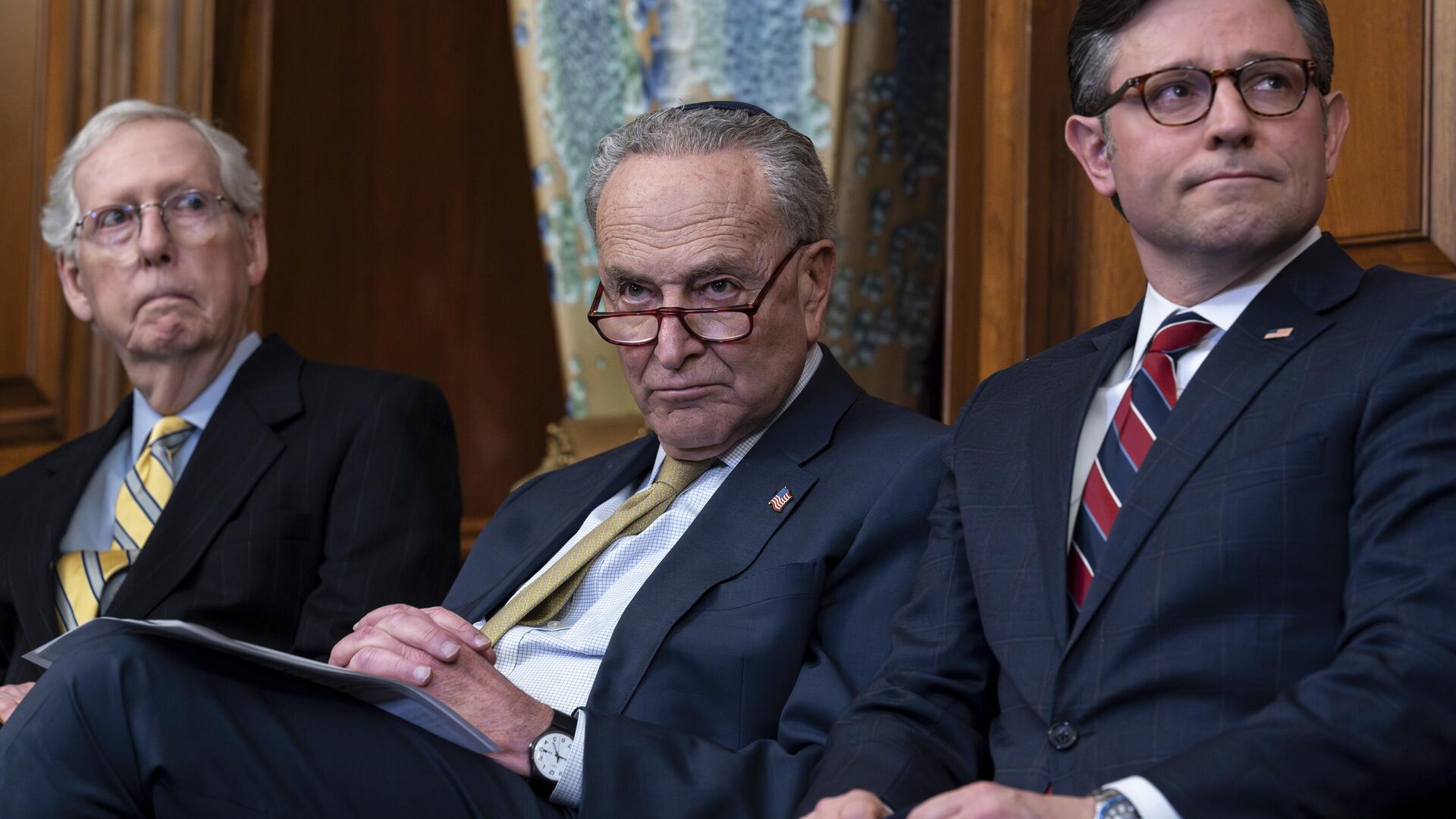https://sputnikglobe.com/20240226/us-lawmakers-trade-barbs-over-govt-spending-in-scramble-to-dodge-shutdown-1116989520.html
US Lawmakers Trade Barbs Over Gov't Spending in Scramble to Dodge Shutdown
US Lawmakers Trade Barbs Over Gov't Spending in Scramble to Dodge Shutdown
Sputnik International
In scramble to avoid US government shutdown, Senate Majority Leader Chuck Schumer (D-N.Y.) and House Speaker Mike Johnson (R-La.) traded volleys of verbal barbs over the weekend.
2024-02-26T11:06+0000
2024-02-26T11:06+0000
2024-02-26T11:06+0000
americas
us
chuck schumer
mike johnson
house speaker
https://cdn1.img.sputnikglobe.com/img/07e8/02/1a/1116988588_0:160:3072:1888_1920x0_80_0_0_dae84bf606a41d3a8c057e9e5ed22856.jpg
Things are getting heated in the scramble to avoid a partial government shutdown. As tempers flared over the weekend, Senate Majority Leader Chuck Schumer (D-NY) and House Speaker Mike Johnson (R-La.) traded volleys of verbal barbs.Schumer aimed a broadside at House Republicans in a "dear colleague" letter on Sunday evening, saying they apparently "need more time to sort themselves out."Despite "intense discussions" with Speaker Johnson's team, he lamented that “extreme House Republicans have shown they're more capable of causing chaos than passing legislation."Schumer urged Johnson to "buck the extremists in his caucus and do the right thing."The House speaker wasted no time shooting back a reply, railing against the "counterproductive rhetoric" he said Schumer's letter was steeped in. He assured that the House had "worked nonstop, and is continuing to work in good faith."Johnson faulted Schumer for failing to mention "new Democrat demands" that were not included in the Senate's spending bills.The terse exchange reflects the tensions running high among lawmakers as they face crunch time to pass as many as four appropriations bills in just three days when both chambers are in session.The haggling over government spending has already resulted in three funding patches that followed last-minute agreements to suspend the debt ceiling in June 2023. Last year, the shutdown deadline was pushed up in September and November, with another funding extension this January. The US House of Representatives suspended legislative business until February 28 after US House Speaker Mike Johnson said lawmakers would not hold a vote on a $95 billion spending bill passed by the US Senate. The bill included money for Ukraine and other foreign policy priorities, but did not include the negotiated bipartisan border agreement with provisions to increase border security. A bipartisan group of US House lawmakers subsequently unveiled a $66.32 billion spending bill — the Defending Borders, Defending Democracies Act — with aid for Ukraine, Israel, and Taiwan, as well as border security measures. US Congressmen Brian Fitzpatrick, Jared Golden, Don Bacon, and others released a statement on the legislation, saying "this legislation would require the suspension of entry of inadmissible aliens to achieve operational control over US borders, require immigration officers to detain and immediately expel inadmissible aliens, and provide $66.32 billion in defense-only funding for Ukraine, Israel, and Taiwan.'' Around $47.69 billion of the money would be allocated to support Ukraine, according to the bill.Some Republicans are expected to continue to oppose efforts to fund the government without spending cuts or policy riders that Democrats view as unacceptable.
https://sputnikglobe.com/20240221/us-house-republicans-expect-federal-govt-shutdown-1116899397.html
https://sputnikglobe.com/20240220/us-house-lawmakers-urge-colleagues-to-back-ukraine-aid--border-security-bill-1116885482.html
americas
Sputnik International
feedback@sputniknews.com
+74956456601
MIA „Rossiya Segodnya“
2024
News
en_EN
Sputnik International
feedback@sputniknews.com
+74956456601
MIA „Rossiya Segodnya“
Sputnik International
feedback@sputniknews.com
+74956456601
MIA „Rossiya Segodnya“
cramble to avoid us government shutdown, white house shutdown, us government shutdown, will us government shutdown, what is a government shutdown, history of us shutdowns, how many us shutdowns have there been, why there can be a shutdown, what comes before a shutdown, what are the reasons for a shutdown
cramble to avoid us government shutdown, white house shutdown, us government shutdown, will us government shutdown, what is a government shutdown, history of us shutdowns, how many us shutdowns have there been, why there can be a shutdown, what comes before a shutdown, what are the reasons for a shutdown
US Lawmakers Trade Barbs Over Gov't Spending in Scramble to Dodge Shutdown
US legislators are still stuck when it comes to a plan to further fund the government. Unless they come up with a decision by the March 1 deadline, the US may face a partial shutdown, with a total shutdown looming by March 8.
Things are getting heated in the scramble
to avoid a partial government shutdown. As tempers flared over the weekend, Senate Majority Leader Chuck Schumer (D-NY) and House Speaker Mike Johnson (R-La.) traded volleys of verbal barbs.
Schumer aimed a broadside at House Republicans in a "dear colleague"
letter on Sunday evening, saying they apparently "
need more time to sort themselves out."
Despite "intense discussions" with Speaker Johnson's team, he lamented that “extreme House Republicans have shown they're more capable of causing chaos than passing legislation."
Schumer urged Johnson to "buck the extremists in his caucus and do the right thing."
The House speaker wasted no time shooting back a reply, railing against the "counterproductive rhetoric" he said Schumer's letter was steeped in. He assured that the House had "worked nonstop, and is continuing to work in good faith."
Johnson faulted Schumer for failing to mention "new Democrat demands" that were not included in the Senate's spending bills.
"Senate Democrats are attempting at this late stage to spend on priorities that are farther left than what their chamber agreed upon," Mike Johnson said.
The terse exchange reflects the tensions running high among lawmakers as they face crunch time to pass as many as four appropriations bills in just three days when both chambers are in session.
The
haggling over government spending has already resulted in three funding patches that followed last-minute agreements to suspend the debt ceiling in June 2023. Last year, the
shutdown deadline was pushed up in September and November, with another funding extension this January.
At the start of the year, the short-term continuing resolution (CR) established a phased, two-step deadline to fund the government. It extended funding through March 1 for about 20 percent of the federal government, dealing with issues such as military construction and the departments of Veterans Affairs, Agriculture, Housing and Urban Development, Transportation, and Energy. The rest of the government is funded until March 8.

21 February 2024, 07:16 GMT
The US House of Representatives suspended legislative business
until February 28 after
US House Speaker Mike Johnson said lawmakers would not hold a vote on a $95 billion spending bill passed by the US Senate. The bill included
money for Ukraine and other foreign policy priorities, but did not include the negotiated bipartisan border agreement with provisions to increase border security.
A bipartisan group of US House lawmakers subsequently unveiled a $66.32 billion spending bill — the Defending Borders, Defending Democracies Act — with
aid for Ukraine, Israel, and Taiwan, as well as border security measures.
US Congressmen Brian Fitzpatrick, Jared Golden, Don Bacon, and others released a statement on the legislation, saying "this legislation would require the suspension of entry of inadmissible aliens to achieve operational control over US borders, require immigration officers to detain and immediately expel inadmissible aliens, and provide $66.32 billion in defense-only funding for Ukraine, Israel, and Taiwan.'' Around $47.69 billion of the money would be allocated to support Ukraine, according to the bill.
Some Republicans are expected to continue to oppose efforts to fund the government without spending cuts or policy riders that Democrats view as unacceptable.

20 February 2024, 08:52 GMT




